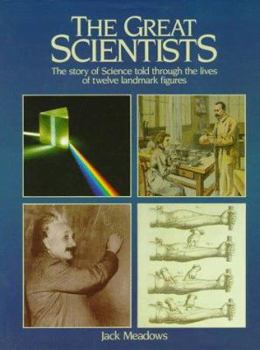The Great Scientists
Select Format
Select Condition 
Book Overview
A lively history of the development of science and its relationship to society, The Great Scientists combines vivid biographies of twelve pivotal scientists, commentary on the social and historical events of their time, and over four hundred illustrations, the majority in full color. The biographies span from classical times to the Atomic Age, covering Aristotle, Galileo, Harvey, Newton, Lavoisier, Humbolt, Faraday, Darwin, Pasteur, Curie, Freud, and Einstein. Apart from Aristotle, who stands at the fountainhead of modern science, these great scientists represent the main fields of inquiry and controversy from the 16th to the early 20th century, from which emerged the modern scientific way of looking at the world.
Through the biographies and a wealth of sidebar material, we see how social forces influence scientific work--how, for instance, the blockade of French ports during the Revolution led to the Leblanc process (needed to make gunpowder), which in turn opened the door to the heavy chemical industry that developed in Great Britain after 1820...how the American expansion westward, which placed great importance on knowledge of terrain and weather, resulted in great advances in geology, meteorology, astronomy, and biology...how developments in hydrography led to an surge in ocean mapping expeditions, including the one that took Darwin to the Galapagos, where he gathered crucial evidence for his theory of evolution...and how Stalin's brutal support of agricultural researcher Lysenko's theories of inheritance--exiling or imprisoning scientists who spoke out against the outdated arguments--paralyzed science for decades in the Soviet Union.
All of this is highlighted by hundreds of informative, color illustrations, with much archival material never before published, ranging from medieval woodcuts, etchings from Renaissance anatomy texts, and pages from Harvey's journal, to modern false-color X-rays and infrared photographs of solar flares.
A beautifully designed, fact-filled, stimulating work, The Great Scientists is an ideal book for anyone with a interest in science and how history can influence scientific discovery.
Through the biographies and a wealth of sidebar material, we see how social forces influence scientific work--how, for instance, the blockade of French ports during the Revolution led to the Leblanc process (needed to make gunpowder), which in turn opened the door to the heavy chemical industry that developed in Great Britain after 1820...how the American expansion westward, which placed great importance on knowledge of terrain and weather, resulted in great advances in geology, meteorology, astronomy, and biology...how developments in hydrography led to an surge in ocean mapping expeditions, including the one that took Darwin to the Galapagos, where he gathered crucial evidence for his theory of evolution...and how Stalin's brutal support of agricultural researcher Lysenko's theories of inheritance--exiling or imprisoning scientists who spoke out against the outdated arguments--paralyzed science for decades in the Soviet Union.
All of this is highlighted by hundreds of informative, color illustrations, with much archival material never before published, ranging from medieval woodcuts, etchings from Renaissance anatomy texts, and pages from Harvey's journal, to modern false-color X-rays and infrared photographs of solar flares.
A beautifully designed, fact-filled, stimulating work, The Great Scientists is an ideal book for anyone with a interest in science and how history can influence scientific discovery.
Format:Hardcover
Language:English
ISBN:0195206207
ISBN13:9780195206203
Release Date:November 1987
Publisher:Oxford University Press, USA
Length:256 Pages
Weight:3.00 lbs.
Dimensions:1.1" x 8.8" x 11.3"
Customer Reviews
1 rating
Excellent resource, but too opinionated.
Published by Thriftbooks.com User , 27 years ago
This book is richly illustrated and puts the life and times of great scientists into historical perspective and context. It is an enjoyable read for anyone interested in learning about the major scientific figures of our history. However, the author seems to push, very subtley I might add, for Christianity. In one instance he says that the existence of God has been proven (150). On numerous pages he makes errant claims, such as the one that Christianity has been science-friendly thoughout history (163). It seems that the author has some conflict between his faith and his science and takes it out on his readers. I don't think this is wrong, but it would be better left out of encyclopedic material. Don't let that turn you off: the pro-religious propaganda is in very small amounts. Aside from that, this book is superb and should make a welcome addition to your bookshelf!






